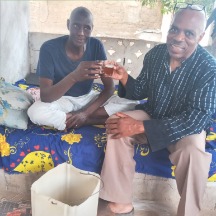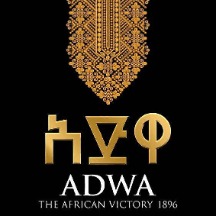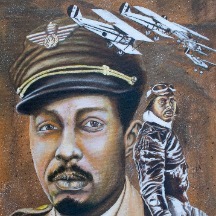Grits, Fufu, Injera Bread, and PanAfricanism
More than 30 years ago, I met my friend Suwareh Jabai. He was in the United States from The Gambia studying where I worked. As we became friends, we would sit around a bowl and eat. He and the other Gambians would eat Benechin with their hands; me with a spoon.As we all got to know each other, I would not eat fufu. And they would not eat grits.
In their Gambian apartment, they were Gambians; I was an American.
We are Africans.
Full-time.
End of Game.
But, when they came to school where I worked, there were people from around the world. One day, Jabai and I made it clear - - as he had differences with some non Africans.
What we made clear: That when we are in his apartment, he is a Gambian and will not force me to eat fufu and I will not force him to eat grits. However, when we sit at the table of international humanhood, we are Africans. Full-time. End of game.
So, today, I look forward to meeting new friends here at the Embassy of Ethiopia in Washington, Douglass Commonwealth. And, I have a package of instant grits in my hand.
Yes, this is often in my suitcase when I head for The Gambia where I still spend time to visit Jabai - - when not doing other things such as the installing this pan-African exhibit at the Juffureh Slavery Museum.
Yes, I like history. And, I first learned of the Battle of Adwa from a film by Haile Gerima. And, I have since internalized the struggle as similar to one in my beloved hometown of Gary, Indiana. Just as your ancestors defeated the notion that Blacks were incapable of defeating Whites, so did my ancestors in the City of Gary when Richard Gordon Hatcher became of the first of two Blacks elected mayors of a major American city.
Also, historically interesting, you know the Battle of Adwa took place in 1896. However, did you know it was the same year that the US Supreme Court said the Blacks had NO rights a White had to respect?
So today, with my new friends including Solomon Hailemariam, I may only taste, but not eat the Injera bread. And, I promise to again not to pull out my bag of grits.
And, today, I am proud to celebrate in this Ethiopian Embassy your earned victory of Adwa. And when we leave this building, I hope we continue to celebrate our victory at Adwa. Full stop. End of game.
Young delivered this message at the 128th Adwa Celebration, Adwa Victory of the Black People; Saturday, March 2, 2024; Embassy of Ethiopia; Washington, D.C.
Suwareh Jabai’s response after reading this on Facebook: “When I saw the post I nearly cried, remembering the old days. Thanks Wayne. It’s good to have good memories.”









